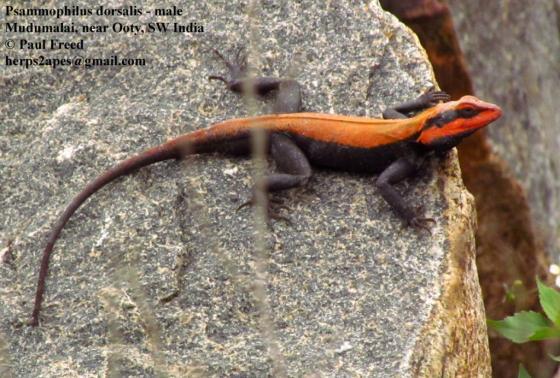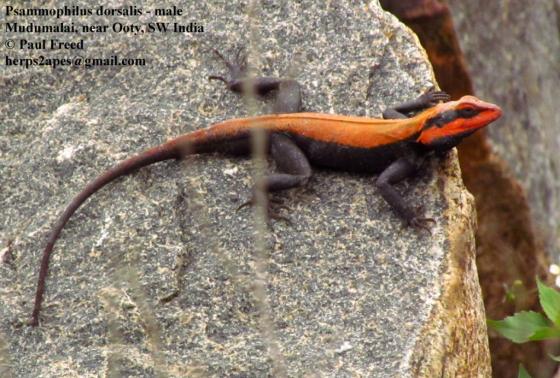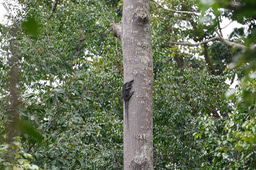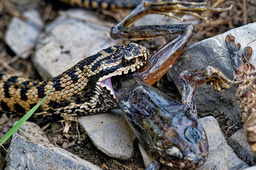
Lizards take more risks when hungry🦎
🦎 A recent study by Avik Banerjee and Maria Thaker reveals that some tropical lizards (Psammophilus dorsalis), under the influence of hunger, risk everything for a chance at a bigger meal. The study challenges a long-standing belief. Reptiles have often been dismissed as slow, instinct-driven animals. But this research suggests otherwise. These creatures are surprisingly calculating. They don’t just react; they strategize.
Birds and mammals have demonstrated this behavior. Many reptiles can slow their metabolism and enter a state of torpor when food is scarce. But tropical lizards don't have that luxury.
🧐 Scientists call this the “risk-sensitive foraging hypothesis.”
The idea is simple: starvation changes animals' attitudes toward risk. When they are full, they choose reliable food sources, even if they are small. When they are starving, they chase larger, uncertain rewards.
👩🔬To test this, the researchers turned to Psammophilus dorsalis, a lizard commonly found in cities like Bengaluru.

The team devised a simple test. First, they divided the lizards into two groups. One group received a lot of food, while the other received nothing for 48 hours.
The two groups were then presented with a choice. One option offered two mealworms, guaranteed. The other option was risky - either zero or four mealworms.
👀The results showed that well-fed lizards stuck to their safe choice - two whiteflies. But starved lizards took risks, much more often choosing the unpredictable option.
Interestingly, both groups of lizards completed the tests with similar net food gains, indicating that the different strategies worked.
🤯 Lizards, often overlooked, may just be thinking more than we ever gave them credit for. And if they can weigh the risks and benefits - who knows what else they are capable of?
🕵For more details, I invite you to read the full paper in a free pdf:
https://www.researchgate.net/publication/389131295_Risk-sensitive_foraging_in_a_tropical_lizard
More interesting facts from the world of herpetology on my new page:
👉 https://www.facebook.com/profile.php?id=61573408584356
#predation #reptiles #inteligence #herpetology #lizards #education #worldwide #strategize #agams #curiosity #animals #biodiversity




Please sign in or register for FREE
If you are a registered user on WildHub, please sign in
🦎 This is such a compelling piece of research, Przemyslaw! This study turns the usual narrative about reptiles on its head. The idea that hunger can drive tropical lizards to make calculated, riskier choices — and that their strategies still yield similar net rewards — really challenges how we think about decision-making in cold-blooded species.
It’s incredible to see how even small shifts in physiological state, like hunger, can reshape behavior so dramatically. I’m curious, do you think this kind of risk-sensitive foraging could influence conservation strategies for urban reptile populations? Especially in places where habitat fragmentation or food scarcity might skew behavior?
Looking forward to diving deeper into the full paper and checking out your herpetology page for more insights. Thanks for sharing such thought-provoking research!
🌿 Warm regards,
Simon.
Hi Simon,
Thank you for your comment and motivating words.
I think it can have an impact in urban populations (and it's a great idea for research).
In terms of conservation, I think the emphasis on environmental fragmentation should be the first to be considered.
regards,
Przemyslaw
Hi Przemyslaw,
Thank you for the kind reply and for highlighting environmental fragmentation. I wholeheartedly agree that it deserves priority in shaping conservation strategies.
It’s fascinating to consider how urban landscapes might alter risk-reward calculations in reptiles. I’m particularly curious whether prolonged exposure to fragmented environments could not only shift individual foraging behavior but even influence long-term adaptations or population dynamics. Your suggestion has me thinking: perhaps coupling behavioral studies with habitat mapping could reveal new patterns in urban reptile resilience?
I’d love to learn more about any research you or your colleagues may have conducted around this. And thank you again for sharing such insightful work; it’s exciting to see herpetology continue pushing boundaries in both science and conservation.
🌱 Warm wishes,
Simon.